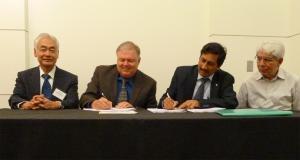India signs two R&D contracts
The Indian Domestic Agency has signed two contracts for the development of the radio frequency sources forming part of ITER's ion cyclotron heating and current drive (IC H&CD) system. The contracts were signed with the American company Continental Electronics Corporation and with Thales Electron Devices, France.
The IC H&CD system is one of the major tools for achieving the plasma performances foreseen in ITER's operation scenarios. This system is designed to provide 20 MW into the plasma, at frequencies included in the band 40 MHz to 55 MHz. ITER India is in charge of the procurement of the radio frequency source subsystem and the corresponding Procurement Arrangement was signed in February 2010. A total of nine radio frequency sources will be provided: eight sources used for plasma operation, plus one spare.
For ensuring 20 MW power availability for plasma operation, 24 MW is required at the output of the transmitter at frequencies up to 65 MHz. As there is no unique amplifier chain able to meet the output power specifications, the layout consists of two parallel four-stage amplifier chains, with a combiner circuit on the output side. This kind of radio frequency source will be unique in terms of its stringent specifications and building a first of its kind is always a challenge.
Each amplifier chain is made of a wide band solid state amplifier cascaded to a three tube based tuned amplifier: a pre-driver, followed by a driver stage and a final stage. In this configuration, the final stage tubes have to achieve challenging power levels.
Only two suppliers worldwide are able to reach the target. In order to identify the best and most reliable technology for building this amplifier chain, R&D contracts were signed with both companies. Results are expected by the end of next year followed by the Preliminary Design Review.



